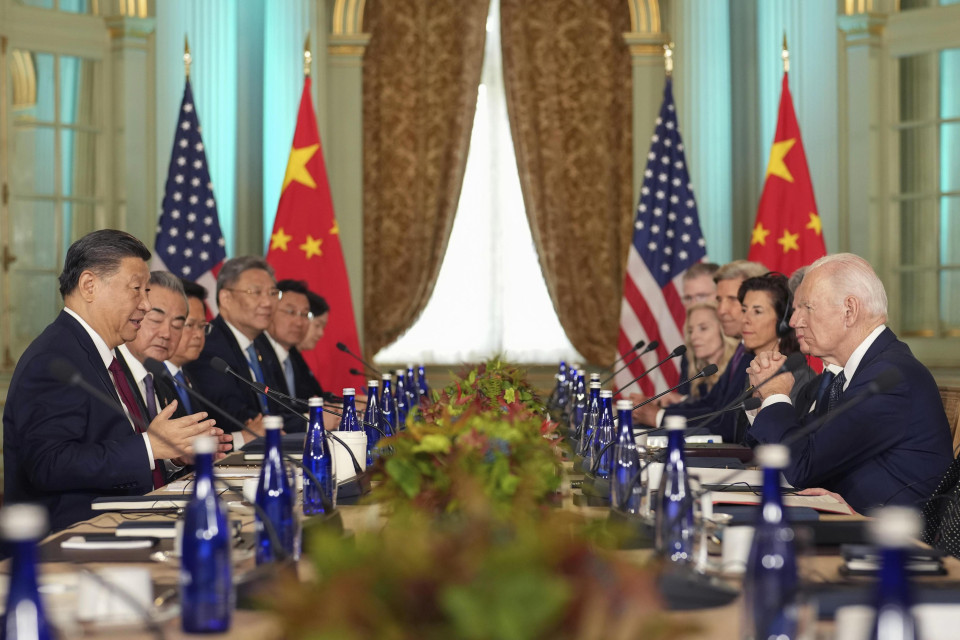U.S. President Joe Biden and Chinese President Xi Jinping agreed Wednesday to reopen military-to-military lines of communication at several levels and take steps on transnational challenges such as counternarcotics to help foster trust between the two major powers.
Following more than four hours of talks with Xi on an estate near San Francisco, Biden said promoting dialogue means that they will also pick up the phone when the urgent need arises.
"Trust but verify, as the old saying goes," Biden said at a press conference, when asked whether he has faith in Xi. "That's where I am. We're in a competitive relationship, but my responsibility is to make this rational and manageable so it doesn't result in conflict."
He also characterized Xi as a "dictator in the sense that here's a guy who runs a country that is a communist country based on a form of government totally different than ours," just after praising the progress made in lowering the temperature between Washington and Beijing.

Biden said other major accomplishments included China's agreement to step up efforts to choke off exports of ingredients for fentanyl, a drug responsible for a deadly overdose epidemic in the United States.
During their first face-to-face meeting in a year, the leaders also agreed to facilitate talks on artificial intelligence to improve the emerging technology's safety and advance collaboration in tackling climate change, according to the two countries.
A senior Biden administration official said that Xi had agreed to create mechanisms for defense authorities of the two countries to present concerns and hold talks at both policy and operational levels, including the reopening of a channel between U.S. Defense Secretary Lloyd Austin and his Chinese counterpart, when named.
The official, who spoke on condition of anonymity, said the deal was "significant" as it would also allow the commander of U.S. Pacific forces to reach out to China, as the United States and its allies are concerned about frequent dangerous maneuvers by Chinese ships and fighter jets around Taiwan and in other parts of Asia.
High-level military communication channels between the two countries have been closed since Beijing cut them in protest following a visit to Taiwan in August last year by then-U.S. House of Representatives Speaker Nancy Pelosi.
On the self-ruled island democracy that Beijing claims as part of its territory, the presidents, as widely expected, reiterated their countries' positions.
Biden said he told Xi that China should not interfere in Taiwan's electoral process, with the island set to hold a presidential poll in January.
Xi told Biden that the United States should take concrete action to honor its commitment not to back Taiwan's independence, stop arming the island and support China's "peaceful reunification," the Chinese Foreign Ministry said.
Xi was quoted as saying "China will realize reunification, and this is unstoppable." He also said China has no plan to "surpass or unseat" the United States, so it should not try to "suppress and contain" the Asian country, according to the ministry.
For security reasons, the meeting, following months of coordination, took place at the historic Filoli estate in Woodside, about 40 kilometers south of San Francisco. It came just before Biden hosts the Asia-Pacific Economic Cooperation forum summit in the center of the city.
The last time Xi visited the United States was in April 2017, for talks with then-President Donald Trump.
At the outset of the meeting, which was open to the press, Xi said China's relationship with the United States is the most important in the world, and he believes they can overcome differences for their citizens and the international community.
Meeting Biden in person for only the second time since the U.S. president took office in 2021, Xi said that "for two large countries like China and the United States, turning their back on each other is not an option."
But he did not forget to say it is "unrealistic for one side to remodel the other," in an apparent message to Washington that it cannot dictate to Beijing, given that the two geopolitical rivals have different political and social structures.
"Planet Earth is big enough for the two countries to succeed," Xi said, while calling for mutual cooperation. As long as the countries "respect" each other, the Chinese leader said, he "firmly believes in the promising future of the bilateral relationship."
Biden and Xi are grappling with bilateral tensions over many other issues, including Chinese territorial claims in parts of the South and East China seas, and the imposition of export restrictions due to national security concerns.
The countries' differing approaches to the Israel-Hamas war, Russia's invasion of Ukraine and how to handle North Korea were also discussed on Wednesday, according to the White House.
The Biden administration has identified China as the United States' top competitor and its "most consequential geopolitical challenge." The bilateral relationship came under heavy strain earlier this year, particularly after Biden in February ordered an alleged Chinese spy balloon to be shot down over the United States.
Related coverage:
Biden, Xi to agree on reopening of military-to-military channels
Biden, Xi to meet Nov. 15 in U.S., new "framework" eyed for complex ties

 By Takuya Karube,
By Takuya Karube,








